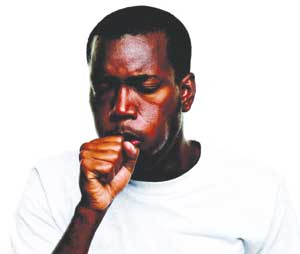November 12 is World Pneumonia Day. Women Editor, TEMITOPE DAVID-ADEGBOYE, writes that contrary to the belief that cold drinks and cold weather cause the ailment, pneumonia is actually a bacterial or viral infection.
 In Nigeria, pneumonia is the second killer of children after malaria. It accounts for about 17 per cent of total infant mortality recorded yearly in the country.
In Nigeria, pneumonia is the second killer of children after malaria. It accounts for about 17 per cent of total infant mortality recorded yearly in the country.
The rate at which Nigerians, particularly children, lose their lives to pneumonia has continued to be of growing concern to medical experts. More worrisome is the fact that many people are ignorant of the factors responsible for the ailment, hence they go about with a wrong notion of the causes.
Ask the nearest person to you the cause of pneumonia, and what you’d probably get “is taking anything cold is the major cause of pneumonia”. Parents do not spare their children and wards either each time they see them taking cold drinks. And even when the weather is hot, mothers would prefer to wear thick cardigans on their children “to avoid pneumonia”.
This notion has equally been passed from generation to generation.
Experts, however, warn that if this notion is not corrected and people fail to key into the fight against pneumonia, more people, especially infants, may continue to lose their lives, especially at the grassroots.
Pneumonia is an inflammatory condition of the lung, affecting primarily the microscopic air sacks known as alveoli. It is usually caused by infection with viruses or bacteria and less commonly other microorganisms, certain drugs and other conditions such as autoimmune diseases.
A consultant paediatrician with the Lagoon Hospital, Ikeja, Dr. Tomi Bamigboje, stated that pneumonia is caused by the Streptocucous Pneumoniae, which is found in bacteria and virus, and not cold water, weather or food. According to her, many Nigerians are ignorant of the factors responsible for the ailment, stressing that contrary to the widely held belief that pneumonia is caused by exposure to cold weather and cold water, the disease is a communicable one caused by a pneumococcal virus.
Pneumonia affects approximately 450 million people globally per year, seven per cent of population, and results in about four million deaths, mostly in developing countries.
The World Health Organisation (WHO) statistics shows that pneumonia kills nearly 1.6 million under-five children annually worldwide. An estimated 98 per cent of children, who die of pneumonia, live in developing countries, and Nigeria is reported to bear the highest burden in Africa.
According to 2008 estimates, about 177,000 children under the age of five died of pneumonia in Nigeria. This means that within an hour, 20 children across Nigeria died from pneumonia. This number is the highest in Africa and second highest overall in the world.
Bamigboje stated that pneumococcal infections occur when children or adults are exposed to germ, and not cold weather, adding that if it was due to cold, all the children in cold regions abroad would have contracted it.
On how this disease is contracted, she said: “When this bacteria or virus gets into the body, either through the mouth or other openings in the body, it goes to the gut, contaminates the blood and goes into the lungs to destroy some cells there. That is pneumonia.
“Parents must know that the way this bacteria or virus gets into the body is through germs contracted under poor sanitation and hygiene. It is not prevented or treated by wearing sweaters or keeping warm.”
She, however, noted that children who are predisposed to this disease are those who have not been exclusively breastfed, who attend daycare and croches, those who are exposed to passive smoke from cigarettes, charcoal, firewood in their homes and those that miss out on routine immunisation.
Symptoms
While symptoms of pneumonia may vary, depending on whether the pneumonia is bacterial or viral, the most common symptoms of pneumonia include:
In bacterial pneumonia, your temperature may rise as high as 1050F. This pneumonia causes profuse sweating, and rapidly increased breathing and pulse rate.
The initial symptoms of viral pneumonia are: fever, dry cough, headache, muscle pain, and weakness. Within 12 to 36 hours, there is increasing breathlessness; the cough becomes worse and produces a small amount of mucous. There is a high fever and there may be blueness of the lips.
Diagnosis
Pneumonia diagnosis include physical exam and chest x-ray; while some patients may need other tests, including CBC blood test, to check white blood cell count and sputum tests to look for the organism (that can detected by studying your spit) causing your symptoms.
Treatment
Treatment for pneumonia depends on the type of pneumonia one has and the severity, and if it is other chronic diseases. The goals of treatment are to cure the infection and prevent complications.
Most people can be treated at home by following these steps:
Drink plenty of fluids to help loosen secretions and bring up phlegm.
Get lots of rest. Have someone else do household chores.
Do not take cough medicines without first talking to your doctor. Cough medicines may make it harder for your body to cough up the extra sputum.
Control your fever with aspirin, non-steroidal anti-inflammatory drugs such as ibuprofen or naproxen, or acetaminophen. Do not give aspirin to children.
If your pneumonia becomes so severe that you are treated in the hospital, you may receive fluids and antibiotics in your veins, oxygen therapy, and possibly breathing treatments.
Typical antibiotics will not work for viral pneumonia; sometimes, however, your doctor may use antiviral medication. Viral pneumonia usually improves in one to three weeks.
In addition to antibiotics, treatment includes: proper diet and oxygen to increase oxygen in the blood when needed. In some patients, medication to ease chest pain and to provide relief from violent cough may be necessary.











